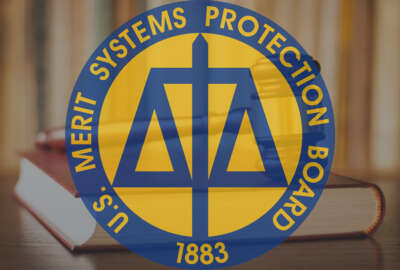
Hubbard Radio Washington DC, LLC. All rights reserved. This website is not intended for users located within the European Economic Area.
Hubbard Radio Washington DC, LLC. All rights reserved. This website is not intended for users located within the European Economic Area.
Federal employment is anything but simple. In fact, each year, thousands of federal workplace cases end up in the courts, federal district, appellate, and admin...
Federal employment is anything but simple. In fact, each year, thousands of federal workplace cases end up in the courts, federal district, appellate, and administrative forums. Joining the Federal Drive with Tom Temin with a quick look at some of the most important cases of 2022, Shaw Bransford and Roth senior counsel James Heelan.
Interview transcript:
Tom Temin
So cases happen in a lot of different venues. And I want to start with the Merit Systems Protection Board, which of course, is not a judicial court, but an administrative court. But I think it’s noteworthy that there’s decisions coming out of there, if only because, for the first time in years they’ve had a quorum.James Heelan
Right. If I could pick the top news story and federal employment for 2022, not just an individual case, I would say the MSPB is back. The board has been hearing cases through its administrative judges that you what you can think of as the trial level of the agency for the last several years. But in 2022, the three-member presidentially appointed, Senate confirmed panel is back. They got a quorum in March, and the chairman was confirmed and appointed, put in her position in June of 2022. So now we’ve got three members, and they are issuing decisions on a multiyear backlog.Tom Temin
Right. Are there any decisions from the board itself, the actual appellate if you will, of the administrative judges that is significant?James Heelan
Yes. It’s incredibly significant. So the board lost its quorum, right before the Trump administration began in January of 2016. And then lost all members altogether in the middle of that year. And so a backlog of appellate cases or appeals from those administrative judge decisions, had accumulated for many years. And now the board, as it’s reconstituted, is going through those cases. And it seems to be prioritizing big decisions. Decisions that change the status quo of federal employment law, or really evolve it in some interesting way or address new laws that have been enacted in the last several years.Tom Temin
Any that come to mind? You’re talking about Thomas v. Department of the Army. This went to the board level itself.James Heelan
Yes, Tom, I see you’re looking at number 10 on my law firms list of the top 10 cases from last year. And it’s really two cases, Thomas v. Department of the Army and Chin v. Department of Defense. These are two cases that go to the facts at issue occurred in 2015 or 2016. And seven years later, the MSPB board three-member panel is reversing penalty decisions, for their administrative judges and changing penalties. So for example, in Thomas v. the Army, it involved a manager who was making female employees uncomfortable in the workplace. And the agency removed that individual for conduct unbecoming a federal employee. the AJ or administrative judge mitigated that penalty to a demotion and a 14 day suspension. The agency appealed, and the three-member board said no. They’re not going to mess around with that kind of conduct in the workplace. It is a removal action. So we have an employee and an agency, who we’re really in limbo for many years, waiting to learn what the final outcome was going to be. And the board said its removal. On the flip side of that coin, Chin v. Defense. This is an employee who took an extra five bucks worth of food at the agency cafeteria, the agency fired the employee for it, it went through appeals. And finally at the board level, again, I think seven years later. The board said no. There’s so many mitigating factors here, look at the Douglas factors, look at the other reasons to give this employee some benefit of the doubt. And they mitigated the penalty and put that person back to work, after seven years.Tom Temin
Yeah, for $5 worth of food. I guess it’s better to steal 500 million as a contractor, than $5 for a piece of pie. You’re not saying that.James Heelan
Right. We’re beyond my practice area.Tom Temin
And I’m gonna get into a lot of hot water for that one. Another case that caught my eye is number seven, who is a government actor under the Fourth Amendment. And I don’t think they mean the SAG union that I’m in, someone who’s engaging on behalf of the government.James Heelan
At our number seven case, this is United States v. John Lewis. And it’s an interesting one in our top 10 list. And that it came out of a circuit court, that wasn’t the Court of Appeals for the Federal Circuit, not the MSPB. This came out of the Fifth Circuit. And it deals with the Fourth Amendment right to be free from unlawful or warrantless search and seizure. Now, when someone, a member of the public, has law enforcement uncover evidence against them in violation of the Fourth Amendment, that person’s remedy, if the criminal court level is to move to suppress that evidence. And the trial courts will suppress evidence that was unlawfully obtained. Now, it can only be unlawfully obtained if it was by a government actor. A private citizen finds drug evidence or weapons or something and turns it over the police. That’s not an unlawful search or seizure. So U.S. v. John Lewis addresses what kind of government employee can violate the Fourth Amendment rights of a member of the public. And this case, it was a U.S. Postal Service letter carrier, who defects a little interesting, found a hole in a box, open the box and found a bunch of methamphetamines. The defendant in that subsequent criminal prosecution moved to suppress. And worked its way through the Fifth Circuit, and the Fifth Circuit said no, that letter carrier, while a federal employee, was not performing law enforcement duties, was not conducting a search for Fourth Amendment purposes. And so that evidence was admissible in that criminal prosecution. So great news, because, evidence pops up everywhere, including in the federal workplace.Tom Temin
We’re speaking with James Heelan. He is senior counsel at the law firm, Shaw Bransford & Roth. And there were a couple of whistleblower cases, defining significant change in duties for [Whistle Protection Enhancement Act (WPEA)] purposes and defining abuse of authority. Tell us briefly about those two cases.James Heelan
Right, some big cases coming out of the board and the Court of Appeals for the Federal Circuit, defining statutory terms. The Whistleblower Protection Enhancement Act is just over a decade old. And there is still some statutory vagaries that had not been defined by the courts or by the board. And in this case of Skarada v. Department of Veterans Affairs, we had the board defining what it means to be a significant change in duties. For the purposes of whistleblower retaliation claims. Whistleblowers are protected, by statute against retaliation in the form of a significant change in their duties. For over 10 years, no one really knew what that meant. So administrative judges had to sort of suss it out for themselves. The Office of Special Counsel had its own individual take on it. Well, the board said, a significant change in duties for these purposes means, a significant change in duties, responsibilities, or working conditions. So responsibilities and working conditions gives us a little more meat on the bone. It tells us that, in this specific case, the board said that a generally unpleasant and unsupportive work environment failed to meet that statutory definition. So we got a little more to work with, than we have for the last decade.Tom Temin
Right. So that means people that are moved to basements and into locker rooms and storage rooms, as kind of I’ll get even with you type of thing, that is or is not part of this allowable.James Heelan
I would I feel more comfortable today, saying that is a significant change and duties. For the purposes of the WPEA retaliation protections. My managers stop saying hello to me in the hallway, my supervisor was more formal with me than they are with the other employees in the workplace. I think under the Skarada decision, that kind of treatment does not rise to whistleblower retaliation.Tom Temin
Ok, gosh, we could go on for hours. But the number one case was that went to the Supreme Court, having to do with the landmark Egbert ruling, called Narrowing Bivens. What’s going on? What did the Supreme Court have to say about federal employment last year?James Heelan
So this may not be new information for some of the Federal law enforcement personnel who are listening. But Bivens is a case that came out in 1971 or ’72 by the Supreme Court, that said that the Constitution itself, created these implied clauses of action. Meaning that the Fourth Amendment allowed lawsuits against individual federal employees for certain violations. In the Bivens case, it was narcotics agents who had unlawfully searched and detained an individual in his home. And so that person was now allowed to sue those agents, personally, and hold them individually, financially accountable. Well, the Supreme Court sort of expanded what Bivens meant and who had applied to, for another, I think, eight years. And for the last 43 years, has not expanded it any further. As in fact, begun walking it back. In this case, Egbert v. Boule is the latest in the court walking back Bivens. And really narrowing it saying, if your case doesn’t look exactly like Bivens, the original Bivens case. It’s probably not going to succeed, because the courts have overreached. This is what the Supreme Court says. The courts have been overreaching, they have been putting themselves in the place of Congress. And the correct question for courts to ask about whether to expand Bivens or apply Bivens to any set of facts, is really whether Congress is in the better place to allow that cause of action or not. And in most cases, the court said the answer is going to be Congress.Tom Temin
So the effect was to narrow the range of officials that can be sued?James Heelan
Exactly. And to narrow the kinds of things they can be sued for. Again, Bivens itself was about, these narcotics agents who went into someone’s home without a warrant. And, I think the word the court used was manacled, that individual to radiator and conducted a very invasive search of the person and of their home. So Egbert v. Boule says if you don’t look just like that, your case probably won’t succeed in the federal court, against a federal employee.Tom Temin
Like if you have secret records parked behind your, nevermind, we won’t go there. So there has been some fundamental change then, in the contract between people in government and between government and itself then from these cases?James Heelan
That sounds right. That sounds like an accurate characterization to me, Tom. We have the Federal Judiciary, trying to restrain itself. That message is coming from the Supreme Court. Federal Judiciary should stick to, what a lot of people would call like, original lists or conservatives. What the judiciary is laying really is, a big movement away or change from what people often call that activist court from the 1960s and 70s, where the court was being much more active in civil rights and other parts of American life.
Copyright © 2024 Federal News Network. All rights reserved. This website is not intended for users located within the European Economic Area.
Tom Temin is host of the Federal Drive and has been providing insight on federal technology and management issues for more than 30 years.
Follow @tteminWFED


